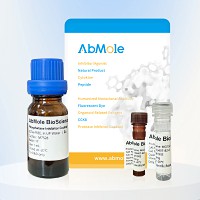All AbMole products are for research use only, cannot be used for human consumption.

Activity: Fixed human PD-L1(His tag) at a concentration of 5μg/mL (100 μL/ well) can bind human PD-1(Fc tag) in a linear range of 0.0625-1ug/mL.
Expression host: human HEK293 cells
Molecular weight: Recombinant human PD-1 protein contains 380 amino acids and has a predicted molecular weight of 43.4 kD.
Purity: ≥95% Was analyzed by SDS-PAGE gel and HIGH performance liquid chromatography.
Endotoxin: < 0.1EU/μg.
Stability: Freeze-dried samples can be stored at 4℃ for 24 months, dissolved liquid can be stored at -20℃ for 6-12 months, and avoid repeated freeze-thaw.
Programmed cell death protein 1 (PD-1), also known as CD279 and PDCD1, is a type I membrane protein that is a member of the extended CD28/CTLA-4 family of T cell regulators. PDCD1 is expressed on the surface of activated T cells, B cells, macrophages, bone marrow cells and thymocyte subsets. Pd-1 has two ligands, PD-L1 and PD-L2, which are members of the B7 family. Pd-l1 is expressed in almost all mouse tumor cell lines, including PA1 myeloma, P815 mast cell tumor, and B16 melanoma, after treatment with IFN-γ. Pd-l2 expression was more restricted and was mainly expressed by DC and a few tumor lines. PD1 inhibits T cell proliferation and related cytokine production, including IL-1, IL-4, IL-10 and IFN-γ, by inhibiting the activation and transduction of PI3K/AKT pathway.
| Solubility (25°C) | ddH2O or PBS |
| Storage |
Powder -20°C 3 years ; 4°C 2 years In solvent -80°C 6 months ; -20°C 1 month |
[1] Qingqing Xiao, et al. Acta Pharm Sin B. Biological drug and drug delivery-mediated immunotherapy
[5] Y Latchman, et al. Nat Immunol. PD-L2 is a second ligand for PD-1 and inhibits T cell activation
| Related Cytokines and Growth Factors Products |
|---|
| Recombinant Human GDF-15 Protein (HEK293 N-hFc)
Growth-differentiation factor 15 (GDF15), also known as MIC-1, is a secreted member of the transforming growth factor (TGF)-β superfamily. GDF-15 has a role in regulating inflammatory and apoptotic pathways in injured tissues and during disease processes. GDF-15 overexpression arising from an expanded erythroid compartment contributes to iron overload in thalassemia syndromes by inhibiting hepcidin expression. |
| Recombinant Human FGFR1 Protein (HEK293, C-His)
FGFR1, also known as CD331, is a full-length representative protein consists of an extracellular region, composed of three immunoglobulin-like domains, a single hydrophobic membrane-spanning segment and a cytoplasmic tyrosine kinase domain. |
| Recombinant Human FGFR2 Protein (HEK293, C-His)
FGFR2, also known as CD332, acts as cell-surface receptor for fibroblast growth factors and plays an essential role in the regulation of cell proliferation, differentiation, migration and apoptosis, and in the regulation of embryonic development. FGFR2 plays an essential role in the regulation of osteoblast differentiation, proliferation and apoptosis, and is required for normal skeleton development. It also promotes cell proliferation in keratinocytes and imature osteoblasts, but promotes apoptosis in differentiated osteoblasts. |
| Recombinant Mouse BMP-4 Protein (E. coli, C-His)
Bone Morphogenetic Protein-4 (BMP-4) is a critical signaling molecule required for the early differentiation of the embryo and establishing of a dorsal-ventral axis. BMP-4 is secreted from the dorsal portion of the notochord, and it acts in concert with sonic hedgehog to establish a dorsal-ventral axis for the differentiation of later structures. |
| Recombinant Human Coagulation Factor X (HEK293, C-Fc)
Coagulation factor X, belongs to the peptidase S1 family. Coagulation factor X is initially synthesized in the liver. Coagulation factor X is a vitamin K-dependent glycoprotein that converts prothrombin to thrombin in the presence of factor Va, calcium and phospholipid during blood clotting. |
All AbMole products are for research use only, cannot be used for human consumption or veterinary use. We do not provide products or services to individuals. Please comply with the intended use and do not use AbMole products for any other purpose.


Products are for research use only. Not for human use. We do not sell to patients.
© Copyright 2010-2024 AbMole BioScience. All Rights Reserved.
